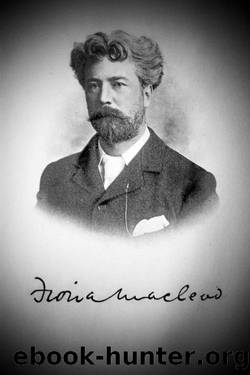The Little Book of the Great Enchantment by Steve Blamires

Author:Steve Blamires [Blamires, Steve]
Language: eng
Format: epub
Publisher: R.J. Stewart Books
Published: 2010-10-10T04:00:00+00:00
Chapter 8
The Celtic Mystical Order and More Secrets
âNever more,â he told us, âwould he tamper with certain forces, for such tampering might mean destruction.â There was a long period from the late 1890s up until 1901 when William, Yeats, Russell, Mathers and others got together whenever they could, wrote, swapped ideas, occasionally smoked hashish, took mescaline, and carried out various magical rites and ceremonies. Although Fiona was often invited to the Paris gatherings she always managed to excuse herself either by claiming ill health or that she was travelling. For example, in a letter to Lady Gregory from Paris dated April 25th 1898, Yeats said, âI am buried in Celtic mythology and shall be for a couple of weeks or so. Miss Gonne has been ill with bronchitis. One of her lungs is affected a little so that she has to rest. She is unable to do any politics for the time and looks ill and tired. She comes here tomorrow to see visions. Fiona Macleod (this is private as she is curiously secret about her movements) talks of coming here too, so we will have a great Celtic gathering.â
Despite her necessary non-appearance she did stay in regular touch, mainly with Yeats, by frequent and lengthy letters. In a letter to Fiona, Yeats said, âI have just finished a certain speech in âThe Shadowy Watersâ, my new poem, ⦠I think it would be very possible to get up Celtic plays ⦠they would be far more effective than lectures and might do more than anything else we can do to make Irish, Scotch and other Celts recognise their solidarity ⦠If we have one or two short, direct prose plays, of (say) a mythological and folklore kind, by you and by some writer ⦠I feel sure we could get the Irish Literary Society to make a start.â 1 This makes it clear that he was keen to collaborate with Fiona and had realised the power of visual imagery in the form of stage plays to influence a mass audience. Fiona would take up this idea but not for some time. Her play âThe Immortal Hourâ would incorporate many of Yeatsâ ideas and suggestions and would become extremely influential later in operatic form. Unfortunately this very play, motivated in part by Yeatsâ comments, was a
167 contributing factor in the split between the Irish school and Fiona when Yeats and Lady Gregory rejected it from being staged in the Irish theatre, not because it was too Scottish or not sufficiently Irish but because both of them believed it frankly plagiarized Yeatsâ âThe Shadowy Waters.â 2 There may be some truth in this but see Appendix 3 for a full discussion on âThe Immortal Hour.â
Differences in political points of view had first become obvious back in 1896 by comments William had made in the compendium of Celtic poetry âLyra Celtica.â Here William did not express any political or social comments as such but did ruffle many Celtic feathers by saying that these Celtic writers were, basically, English.
Download
This site does not store any files on its server. We only index and link to content provided by other sites. Please contact the content providers to delete copyright contents if any and email us, we'll remove relevant links or contents immediately.
Becoming Supernatural by Dr. Joe Dispenza(8217)
Crystal Healing for Women by Mariah K. Lyons(7931)
The Witchcraft of Salem Village by Shirley Jackson(7275)
Inner Engineering: A Yogi's Guide to Joy by Sadhguru(6796)
The Four Agreements by Don Miguel Ruiz(6765)
The Power of Now: A Guide to Spiritual Enlightenment by Eckhart Tolle(5783)
Secrets of Antigravity Propulsion: Tesla, UFOs, and Classified Aerospace Technology by Ph.D. Paul A. Laviolette(5371)
The Wisdom of Sundays by Oprah Winfrey(5162)
Room 212 by Kate Stewart(5123)
Pale Blue Dot by Carl Sagan(5008)
Fear by Osho(4740)
The David Icke Guide to the Global Conspiracy (and how to end it) by David Icke(4720)
Animal Frequency by Melissa Alvarez(4474)
Rising Strong by Brene Brown(4463)
How to Change Your Mind by Michael Pollan(4357)
Sigil Witchery by Laura Tempest Zakroff(4246)
Man and His Symbols by Carl Gustav Jung(4137)
The Art of Happiness by The Dalai Lama(4130)
Real Magic by Dean Radin PhD(4129)
